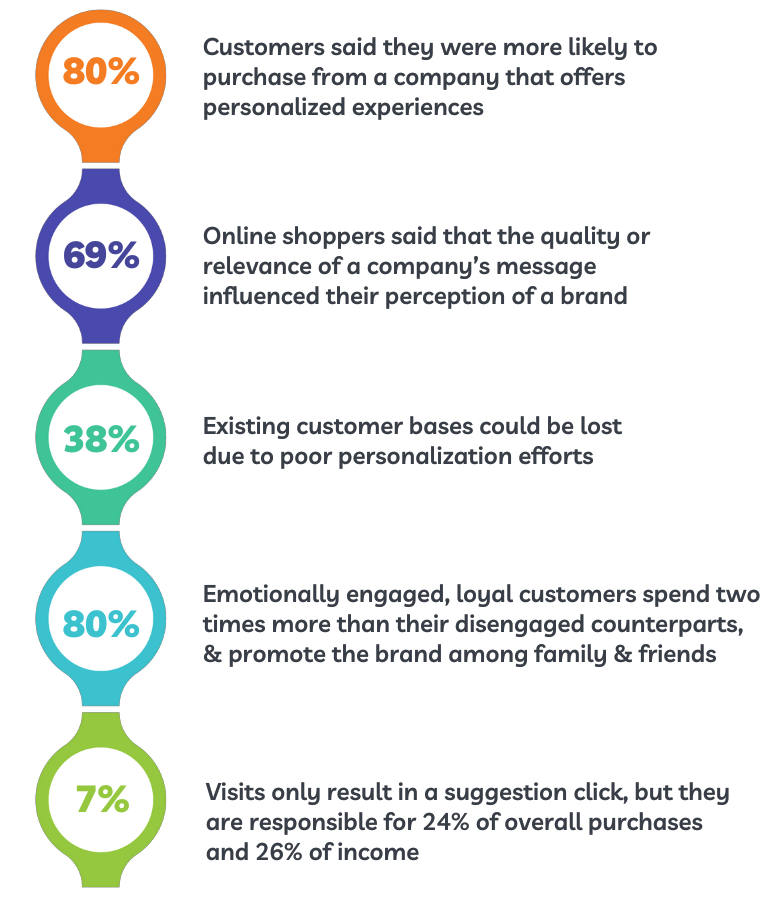A PwC poll revealed that over half of the respondents said their buying habits had become “more digital” as a result of the pandemic. In 2020, online shopping accounted for 19.6% of retail sales, up from 15.8% in 2019. As customers realized how quickly and easily they could buy what they wanted from their homes, many became lifelong converts.
However, even as e-commerce continues to grow, it’s not all smooth sailing. Retail brands and marketplaces with thousands of products in their inventory face two common problems:
One: An increasing number of product views that do not lead to conversions
Two: Replicating the personal touch of in-store shopping
AI can help address both these challenges effectively through laser-sharp personalization.
Personalization in the E-Commerce Era
A sad reality for many e-commerce retailers is that product views do not translate into better revenues. Customers may flip through scores of options, but are they really making purchases? One study revealed that 70% of consumers do not look past the first three pages, making the subsequent pages irrelevant inventory.
Many businesses have attempted to bridge the gap by offering some form of personalization. However, to most online retailers, this is little more than a revolving carousel of recommendations that works on segmentation. It simply lumps customers into large demographic groups based on historical data and stereotyped categories such as gender and age. Though this form of segmentation can suggest a few relevant items, it does not really count as personalization as every client in the specified category sees the same product.
Many other sites use machine learning technologies that examine product correlations, identifying which goods are often bought together. This insight is limited in scope; it would be far more useful to examine the interaction between the specific customer and the type of goods he/she engages with.
But where neither segmentation nor machine learning have delivered the customized experiences customers desire, AI can make a real difference because of its innate personalization capabilities.
Ecommerce personalization refers to a set of practices in which an ecommerce marketplace showcases dynamic content based on consumer data, such as demographic factors, purchase intent, interests, browsing habits, purchasing patterns, and device type. It’s an important consideration as studies show that personalized product recommendations drive revenue.
Here are a few recent statistics that underscore the importance of personalization:

Clearly, when brands can provide convenience, customer understanding, and emotional engagement, customers are likely to be more loyal, resulting in higher profitability.
How AI Can Help Personalize
With AI, e-commerce businesses can provide the personalization shoppers crave, transforming every visit into a highly personal experience. New, AI-powered solutions take a one-product-to-one-shopper approach, building unique behavioral profiles based on over 300 data points per customer and predicting the next steps with a fairly high degree of certainty.
This kind of e-commerce shopping experience is highly adaptable, reacting and changing in real-time based on the customer’s unique demands and needs. If done right, no two customers will ever have the same experience.
Here’s how AI-powered personalization can help online retailers.
Meet Customers at Their Point of Need
There is no better way to create enhanced consumer experiences than by anticipating desires and providing customers with their favorite items at the right time. AI employs sophisticated machine learning algorithms to monitor browser history, page clicks, social activities (likes, shares), prior purchases, dwell times, geography, and so on, to determine a customer’s interests and preferences. By analyzing patterns of frequently purchased items and adapting web pages and features to meet the demands of individual customers, AI can meet customers at their point of need. As a result, businesses can better manage their inventory while customers benefit from an enjoyable shopping experience.
Enhance the In-Store/Offline Experience
AI is also capable of enhancing the in-store experience. For example, AI-enabled kiosks and robots can assist customers in locating products within the store through voice commands or touch screen interfaces. AI can also assist in developing product suggestions based on a customer’s profile, shopping history, search queries, etc. AI-driven virtual assistants can respond to customer questions and make data-driven recommendations whenever customers require them. Augmented Reality interfaces, powered by artificial intelligence, will help customers test things without physically trying them on, thus aiding the purchase decision and enhancing the customer experience.
Improve Customer Support
In customer service, artificial intelligence significantly saves service time and helps minimize operational expenses. Using AI-powered chatbots and messaging agents to address customer issues in real-time will make customers feel cherished and enhance their overall experience. Programs powered by artificial intelligence can also deliver automated communications to customers of a scheduled service, a replacement part, or a recurring order. It can also facilitate creating automated service requests and provide support for order status, basic order changes, returns, and refunds.
Promote Omnichannel Buying
Eventually, the online and offline experiences should work together to boost sales. For instance, one retail giant has come up with the concept of offering various 4-star rated products at a physical store by using its product recommendation engine to identify trending products and customers’ favorites. This ensures that the offline experience is profitable for both the company and the customer; the company saves retail real estate by stocking products with a high likelihood of conversions, while customers can shop with confidence, knowing they are buying products that are peer-approved.
Others use AI-gathered data for personalized targeting, allowing customers to try best selling products at the physical stores, thus simplifying the shopping experience and saving the company the hassle of having to deal with product returns or investing in full-fledged retail stores.
Reach Customers With More Targeted Campaigns
AI can help retailers reach prospects with on-point offers. A smart use of AI-powered customization collects a shopper’s preferences at the time of purchase and pairs them with relevant product data to give suggestions across numerous touchpoints. AI-driven emails can recommend products based on shoppers’ style profiles, preferences, and browsing history. It can encourage repeat purchases. If a consumer recently bought jeans, offer them matching shirts, shoes, and caps. This method, borrowed from what is known as the Diderot effect, has been proven to spur a greater number of impulse purchases.
AI can also help with retargeting. There is a tremendous wealth of information that can be utilized to improve the sales cycle. For instance, facial recognition can track customers’ in-store dwell times and that data can be used for subsequent visits. As AI improves, unique offers could appear on customers’ computer displays based on their in-store dwell time. Thus, the ability of omnichannel businesses to remarket to customers will increase.
How Valiance Uses AI-powered Personalization
At Valiance Solutions, we are working with online retailers to personalize their customer outreach using interaction data collected from tools like Clevertap and MoEngage. With the help of AWS Personalize and other AWS services, we are quickly able to collect, ingest, and transform data for the rapid creation of algorithms in 2-4 weeks, which can be used to generate personal recommendations in batches or in real-time. Recently, we created a product recommendation engine for a retail giant, enabling clients to quickly find their products from over 10,000 household goods.
Reach out to us if you are looking to use AI/ML for personalized customer engagement.









